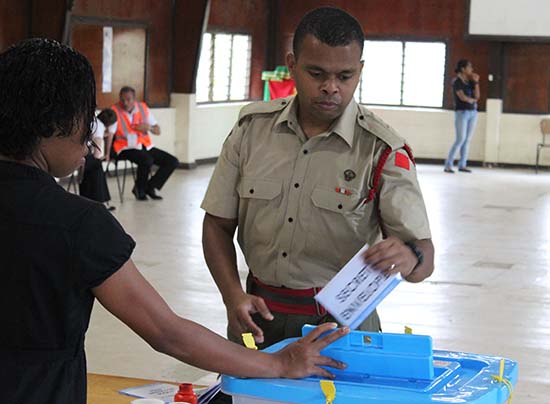
Media freedom in Fiji, Philippines, Timor-Leste and West Papua will come under the spotlight at this month's Pacific Journalism Review 2014 conference.
The conference, with the theme "Political journalism in the Asia-Pacific" from November 27 -29 at AUT University in Auckland, is being held to celebrate 20 years of publication of the Pacific Journalism Review journal.
A robust review of the elections in September - eight years after the 2006 coup, which saw the introduction of repressive laws curtailing freedom of expression and the media, government accountability and the judiciary - will be featured with six speakers presenting papers on the topic.
Fiji National University ethics and governance lecturer Mosmi Bhim will review whether the elections were really "free and fair".
Bhim will discuss how, "in an atmosphere of lavish campaign advertisements on billboards, public transport vehicles and the daily media by the coup-installed Prime Minister Voreqe Bainimarama’s political party, Fiji First, political parties struggled to have their voice heard amidst the limitations".
Two daily media companies – the Fiji Broadcasting Corporation and the Fiji Sun newspaper – displayed blatant bias towards the Fiji First party, which is headed by Bainimarama and which won the election, by providing them excessive and preferential coverage and portraying other parties in a negative light.
There were also harsh crackdowns by police on "trouble-makers" who vandalised Fiji First posters.
Bhim has analysed media materials, campaigning, polling and results calculations.
Academic freedom
Academic and broadcaster Pat Craddock will also discuss an attack on academic and media freedom at the Fiji-based regional university months before the election.
Craddock and another journalism lecturer, Australian author and investigative journalist Matthew Thompson, both left the University of the South Pacific in July this year after they came into conflict with the military regime and the university for releasing a controversial press statement criticising the army's defence of torture on civilians.
Assistant journalism lecturers Eliki Drugunalevu and Irene Manueli will talk about how the USP journalism training newspaper, Wansolwara was able to skirt around media censorship in Fiji to report on some major national issues as part of student learning.
Nick Chesterfield, founder of the West Papua Media news service, will speak on how to overcome "media mythmaking, malignancies, and dangerous conduct in West Papua reportage".
While media freedom in West Papua has recently been in the news, following the arrest and 14 week detention of two French journalists by the Indonesian regime, West Papua often finds itself in a media abyss.
Foreign journalists are banned unless they obtain a rarely granted permit from the Indonesian government, and accept being accompanied on their stories by Indonesian intelligence officers.
Keynote speakers at the conference include filmmaker and political journalist Max Stahl who broke the news of the 1991 Santa Cruz massacre in Dili and who has documented the birth and evolution of his adopted nation Timor-Leste; Repúblika magazine chief editor Ricardo Morris of Fiji; and Ces Oreña-Drilon, an award-winning Filipino television journalist once kidnapped by Abu Sayyaf rebels.
She also had death threats over her investigation into the judicial cover-up about the 2009 Ampatuan massacre.
Conference webpage and programme
Registration
Conference convenor and contact: Professor David Robie



